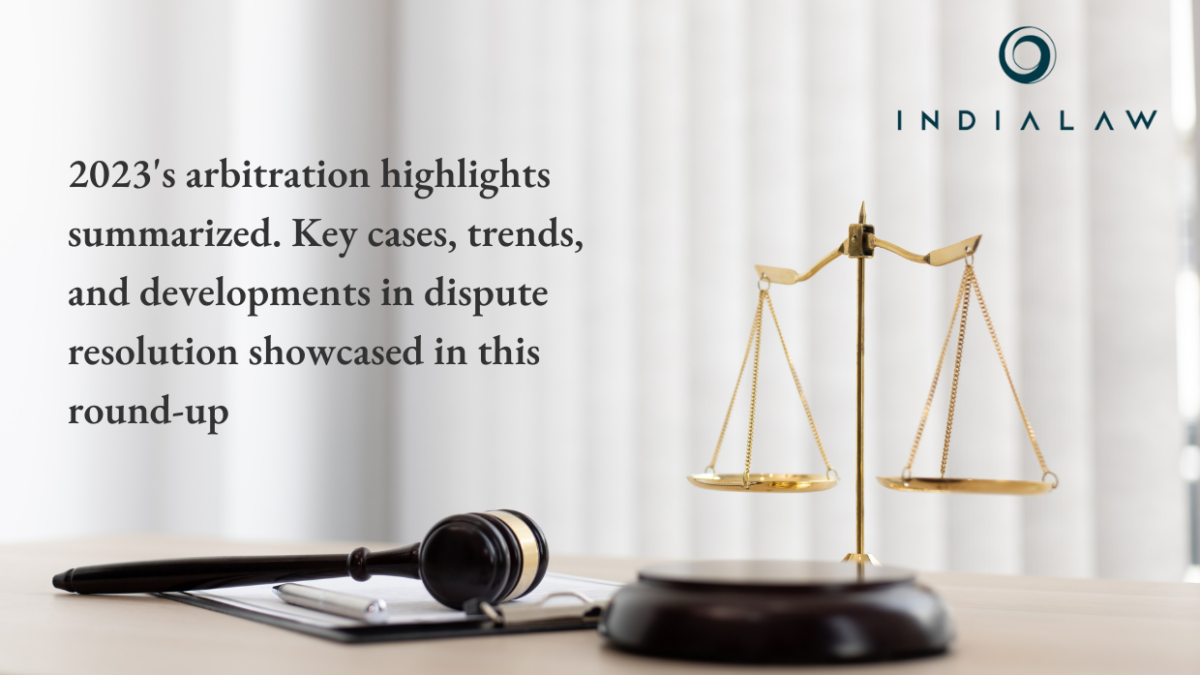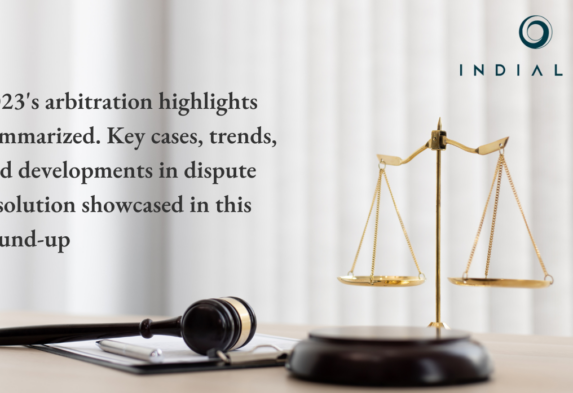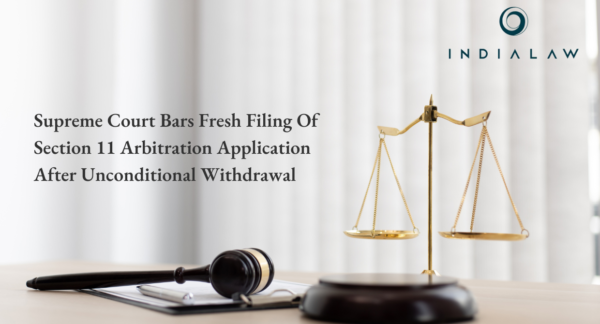Arbitration Round-Up: 2023 So Far


1) Karnataka High Court: J.K. Technosoft Limited vs. Unikul Solutions Private Limited (11th July 2023)[1]
The Hon’ble Karnataka High Court, based on the thumb rules of the much-deliberated judgment passed by the Hon’ble Supreme Court in N.N. Global Merchantile Pvt. Ltd., held that though the agreement is not duly executed by the parties (in this case one of the parties), the document can yet be construed and accepted as a contract in terms of S. 7 of the Arbitration & Conciliation Act, 1996 (“the Act”) and Section 10 of the Indian Contract Act.
Now arriving on the aspect of impounding of a copy of a document and payment of stamp duty due thereon, the Hon’ble Court held that since the parties have not produced original documents at the juncture of proceedings of S.11 of the Act, the question of impounding the document and payment of stamp duty does not arise.
2) Calcutta High Court- Homevista Decor & Furnishing Pvt Ltd v.Connect Residuary Pvt. (8th June, 2023) [2]
The Hon’ble Calcutta High Court, in congruence with the judgment passed in ISGEC Heavy Engineering Ltd. v. Indian Oil Corpn. Ltd., observed that the ‘venue’ indicated in the agreements is merely a convenient place to conduct arbitration proceedings and that it does not inevitably become a seat of arbitration.
3) Supreme Court: B&T AG v. Ministry of Defence (18th May, 2023)[3]
The Hon’ble Supreme Court clarified that the “breaking point” refers to a moment when a reasonable party would abandon settlement efforts and consider arbitration. In this case, it was when the warranty bond was encashed and transferred to the government’s account, marking the cause of action and starting the limitation period. Since the Act doesn’t specify a time limit, Article 137 of the Limitation Act applies, and the time limit starts without being delayed by settlement discussions.
4) Delhi High Court- Maj. Pankaj Rai v. NIIT Ltd. (16th May, 2023)[4]
In this matter, the Hon’ble Delhi High Court held that the mandate of the arbitrator(s) can be terminated on grounds inter alia owing to ineligibility that is if his appointment falls within the grounds enumerated in the Schedule VII of the Arbitration and Conciliation Act, 1996 (“the Act”).
According to the Hon’ble Court, only the criteria enshrined in the said Schedule, de jure renders the appointment ineligible on the basis of bias and prejudice.
5) Delhi High Court: Department of Transport, GNCTD v. Star Bus Services Pvt. Ltd. (16th May 2023)[5]
The Hon’ble Delhi High Court held that if there is an unexplained inordinate delay of 18 months in passing an arbitral award after the culmination of the hearing, it can be challenged under Section 34(2)(b)(ii) of the Act as it is in derogation of public policy of India. The said court while expressing its disapproval observed that such delays render arbitration ineffective thereby defeating the purpose of arbitration which is to provide speedy resolution of disputes.
6) Bombay High Court: Sunil Kumar Jindal vs. Union of India (4th May 2023)[6]
The Hon’ble Bombay High Court held that when the parties intention to refer their disputes for arbitration is apparent from the arbitration clause, the parties cannot be permitted to deviate as that is the chosen forum agreed between the parties. It is the parties’ prerogative to resolve disputes by arbitration and to nominate/appoint an arbitrator. Both the prerogatives are separate and therefore are severable from each other.
7) Supreme Court: N.N. Global Mercantile Pvt. Ltd v. Indo Unique Flame Ltd. (25th April, 2023)[7]
The Hon’ble Supreme Court inter alia held that an unstamped instrument without the required stamp duty is void and unenforceable. It further held that the courts must adjudicate upon the appropriate stamp duty payable in accordance with the applicable provisions of the Indian Stamp Act on the principal agreement containing the arbitration clause while entertaining application under S.11 of the Act for the appointment of the arbitrator i.e if the court finds that there is a discrepancy with respect to the stamp duty payable on the agreement, the instrument is liable to be impounded at that stage itself.
8) Calcutta High Court: Cholamandalam Investment & Finance Company v. Amrapali Enterprises (14th March 2023)[8]
The Hon’ble Calcutta High Court observed that when an arbitral award is passed by an arbitrator appointed unilaterally, the same shall be deemed to be non-existent and hence non-enforceable as per the provisions of Section 36 of the Act. The said qualification shall also apply in cases wherein the said award has not been set aside in terms of Section 34 of the Act. Further, the Court held that it inherently lacks jurisdiction to interfere with the award and in the interest of justice directed the parties to readdress their dispute before an unbiased and impartial arbitral tribunal.
9) Delhi High Court: ITD Cementation India v. SSJV-ZVS Joint Venture (7th March, 2023)[9]
The Hon’ble Delhi High Court held that the contract was executed by the joint venture itself acting for and on behalf of all its constituents. Therefore, it is clearly entitled in law to proceed against the Respondents jointly and severally. The said court added that in any case, a constituent of the joint venture cannot escape from the liability which stands raised or arises from that venture. It would remain, as noted above, jointly and severally liable.
10) Calcutta High Court: McLeod Russel India v. Aditya Birla Finance Limited(14th February 2023)[10]
The Hon’ble Calcutta High Court considering that the arbitrator was a retired judge of the Madhya Pradesh High Court, who did not fall within the ambit of the criteria for ineligibility provided under the Schedule VII of the Act held that the appointment of an arbitrator does not fall flat in case wherein the appointment of the arbitrator was made by one of the parties to the dispute.
11) Supreme Court- TATA Sons Pvt. Ltd. v. Siva Industries & Holdings Ltd. (5th January 2023)[11]
The Supreme Court has held that the time limit stated under the amended S.29-A of the Act makes it amply clear that the mandatory statutory period of 12 months for passing an award is only applicable to domestic arbitrations and does not apply to International Commercial Arbitrations. Furthermore, the said Section 29-A being retrospective in nature, also applies to the pending international commercial arbitrations as well.
[1] Karnataka High Court – CIVIL MISC. PETITION NO. 77 OF 2023
[2] 2023 SCC OnLine Cal 1405
[3] 2023 SCC OnLine SC 657
[4] 2023 SCC OnLine Del 2825
[5] 2023 SCC OnLine Del 2890
[6] Bombay High Court – MISC. CIVIL APPLICATION NO.543/2022
[7] 2023 SCC OnLine SC 495
[8] 2023 SCC OnLine Cal 605
[9] (2023) 2 HCC (Del) 44
[10] 2023 SCC OnLine Cal 330
[11] (2023) 5 SCC 421





[…] 1) Karnataka High Court: J.K. Technosoft Limited vs. Unikul Solutions Private Limited (11th July 2023)[1] […]